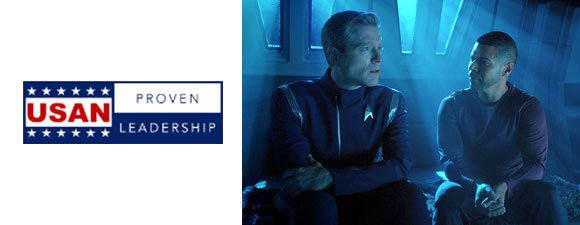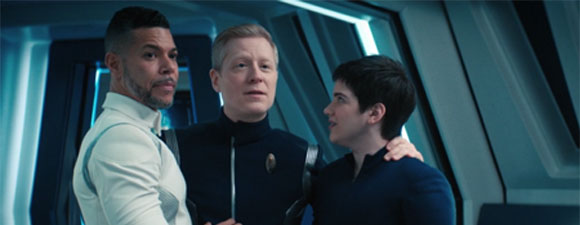Moore And Behr: Hitting The Ground Running
3 min read
For Star Trek writer/producers Ronald D. Moore and Ira Steven Behr, there was no honeymoon period when it came to writing for Star Trek: The Next Generation.
Both joined the show during its third season and had to hit the ground running.
Moore came on board after his story was found in the slush pile by Michael Piller. “Piller came aboard in the beginning of the third season, and started going through the slush pile, and found my script and bought it,” said Moore. “I got a really lucky break and I had the right script at the right time; he was looking for something like that… that started my whole career, basically.”
Being on staff for Moore meant working hard and working quickly. “Once I was on the staff, here’s the work, and you either did it or you didn’t,” he said. “There was a certain pace that the show went at. I remember very clearly, my first full day on the show. Michael gave me a memo, or a story outline that they couldn’t make work, and he said, ‘Here, go try to make this work.’
I sat down and just wrote up a new version and sent it downstairs; an hour or so later he sent it back up with a bunch of notes on it. Then I wrote up another version and sent it downstairs; the same then happened like twice more. I started putting the time up in the corner; I was literally putting the time of this draft… Michael, at some point, just laughed. ‘You don’t have to do it this fast!’
“I didn’t know what the pace was! I just assumed that when it was given to me, I had to write it as quickly as possible, and fortunately, that was a really important strength to have on a television series, to be able to do it quickly and get it out.”
Behr was hesitant to join The Next Generation because “they were cutting off writers’ heads left and right and it was a bloodbath every week,” he said.
“…it sounded like a complete and utter horror show. They were firing writers left and right; the one that killed me was you’re not allowed to go down to the set as a writer/producer, because it’s not allowed. I said that I’d never heard that anywhere before! And there’s a lawyer who goes around looking through desks at night to find things that they wrote about Gene Roddenberry, because he was Gene’s lawyer, and it was like, “Is this serious?!”
Behr had said “no” to Maurice Hurley, but a year later, Piller convinced him to come on board. He was handed a script for The Hunted and told to “rewrite act 3.”
Behr was on his own and he had to quickly brush up on Trek technology. Richard Danus, who was on his way out, “explained what a Jefferies Tube was, and I went back and literally banged out by hand on a yellow pad, Act 3, scared out of my mind,” said Behr. “There was some dialogue obviously in there, but I was just like throwing it up in the air and hoping there was a parachute attached.”
But both men managed to survive their initial experiences and both went on to Deep Space Nine.







Slush pile is what I would call Ronald Moore’s work on Star Trek – Generations and the Battlestar Galactica remake, among other things.
What’s the matter? Somebody kill your daggit? Moore turned Galactica from a campy joke into something worth watching. Not to mention the fact that the problems with Generations were more Shatner’s fault than anybody else’s.
I agree with you regarding BSG, but Generations was Shatner’s fault? Howso? Shatner wasn’t the one to originally script Kirk being shot in the back… nor did he script him falling unceremoniously off a bridge to his death… Shatner wasn’t why DK and LN didn’t reprise as McCoy and Spock. What part of that production was Shatner responsible for other than his own performance?
Generations fails for me because of the handling of Kirk’s death, the unnecessary changes to Enterprise for lighting, which just makes it feel weird… the moody feel brought about by the burning to death of Picard’s family, and the lackluster plan from Soran himself. The entire movie is full of bad science, and I don’t even mean wonky science, but bad, in the sense that they fire a rocket that doesn’t seem all that fast, but somehow Enterprise couldn’t shoot it down before it gets to the star… and then, the light from the star begins to diminish immediately… It takes 6 minutes for light to reach Earth from our sun, but not on Veridian III… that’s instant… A quibble, sure, but it’s indicative… Add to that the stupid Christmas sequence in the Nexus, and you have a pretty good recipe for a pretty bad Star Trek movie… Shatner is in the movie for like 15 minutes… and the Enterprise-B stuff is pretty entertaining, and his Nexus stuff is easily the best part of the Nexus… The final showdown is lame, but again, I doubt Shatner was the fight choreographer… I guess maybe it’s cool to bash Shatner??? But I don’t see how any of the bad stuff is Shatner’s fault… But maybe I’ve missed some huge element of Generations lore that would explain it… I’m certainly curious why you think that.
It’s not cool to bash Shatner, and I really should have mentioned as well whoever the hell decided that Shatner et al. had to be included in the movie in the first place, which never should have happened. But, according to the dvd commentary by Moore and Braga, it was Shatner who insisted he had to be central to the plot, when at most he should have had a glorified cameo such as Nimoy had in the first Abrams movie. It’s always seemed to me that the inadequacies of Generations stem from that awful decision to make it a hybrid movie, as if TNG didn’t deserve it’s own movie right from the beginning. Remind me again which show had enough fans to last 7 years (and with zero network support, btw) and which didn’t?
As for the bad science, well, if that’s a problem you’re watching the wrong shows. For me, Trek is interesting in spite of the bad science and the obvious plot holes which permeate the whole enterprise (and I snicker at myself shamelessly).
Given the elements they were required to work with, I think it’s amazing Moore and Braga managed to write anything at all.
Really, the only wonky science in TNG that’s ever really bothered me was that rocket in Generations and the fact that they botched the central aspect of All Good Things… Both are instances where the science is central to the plot. In Generations, they could’ve just made the design of the rocket less rockety and more warpy, which would account for Worf being unable to shoot it down. In All Good Things… they encounter an anti-time rift that they should see closing when they first arrive in the future, but instead, they see nothing, and then, only upon going back, do they see it forming… though, that’s entirely a violation of what the anomaly is supposed to be… My point is, it’s only when they establish the science as the central element that I quibble with the science… Had they spent 5 more second on Red Matter, I’d feel the same about it in the 2009 movie…
As for Shatner wanting a bigger role, isn’t that exactly why Nimoy wasn’t in it (that they weren’t giving him anything much to do)?
I tend to agree that they didn’t need to go there… but Shatner playing the card Shatner had played for 35 years at that point, namely his being the biggest name on the marquee, was hardly surprising, was it? When you force your script to include Shatner, sure, you’re going to have to please Shatner enough to appear… So, yeah, you’ve drawn the proper conclusion: If you can’t do it well or right, don’t include him. They decided to include him. I don’t blame Shatner that he wanted it to be central… I blame them for being unable to write a significant cameo that would’ve appeased him, or being unable to tell him no.
But Shatner didn’t write it, he didn’t direct it, and he did exactly what they asked of him, down to being shot in the back… So… Moore gets my ire for this one.
That All Good Things problem has always bothered me a little also, but time travel is always the worst as far as logical consistency goes. It certainly doesn’t bother me enough to keep me from loving it. But Trek got me young – my second earliest memory is of the Corbomite Maneuver, either during it’s original showing or a summer rerun. Third earliest, unfortunately, involves And the Children Shall Lead, also either original or summer rerun. When they get you that early, you’re theirs for life so the problems don’t bother you that much.
I’ve never heard anything about why Nimoy and the others weren’t in it, but it would only have made a bad situation worse. I was surprised Doohan would agree to work with Shatner again, but I suppose he needed the money.
I guess you can’t really blame Shatner for being Shatner, but I still think Moore did the best he could with the cards he was dealt.
I still like Ron Moore and think his contributions to Trek and BSG are amazing. I just think, in this instance, the whole group dropped the ball.
Interestingly, one of my very first memories is The Motion Picture… and I already knew the characters, but didn’t remember seeing actual episodes before that… but I remember my reaction to Scotty in particular… I didn’t understand why they recast him. It wasn’t until I was like 6 that I realized he just got old and fat and was the same guy! But yeah, Star Trek is so engrained, I remember that movie, but the show itself, I don’t even remember watching for the first time because I was so young… I just remember it always being there… And while I’ll always love it as much as anything, I can see the flaws… But hey… we wouldn’t be talking about something this long on if it didn’t strike a chord…
I would hardly call the original as a campy joke. Galactica 1980, YES, MOST DEFINITELY!!!! That spinoff was indeed a campy joke! But the original Battlestar Galactica was NOT! It was a classic series that had a lot to offer. Sadly, ABC and Universal got too big for their britches and didn’t allow Glen Larson and the production staff the chance to let the original develop and grow. Remember, the original was going to start out as a seven part mini-series. But ABC/Universal pushed them too fast into doing a television series. The production staff was not yet ready and equipped to handle BG as a series on a weekly basis. Think about that.
Blue Thunder’s comment demonstrates profound ignorance on his part. Ronald Moore’s contributions to the Star Trek universe are enormous. His work on both Next Generation and DS9 took those shows to great heights. His writing brought a new gravitas to the franchise. The late Michael Piller was a wise man to have hired him. Writers like Moore and Behr and others hired by Piller probably did more to keep Star Trek on the air than anybody or anything else. The first two seasons of Next Gen were rocky. It all changed in season 3 with the arrival of Piller and his new staff. The rest is history.
Profound ignorance my ass! Ronald Moore’s contributions to the Star Trek universe were anything but enormous. If nothing else, they only contributed to the franchise-fatigue era that was starting to show its true colors by then. New gravitas? Hardly! More like a near death sentence to the franchise that had enough problems. Especially with Paramount’s executives taking way too many trips to the well and recycling the same old storyline shit, different episode type of shows.
That’s overstating it a bit, isn’t it?
Moore gave us Yesterday’s Enterprise and a lot of other quality TNG episodes as a writer, story editor, and producer. DS9’s content was greatly improved by Moore’s plight to reach beyond the platitudes of Gene Roddenberry’s utopian vision and make it more realistic… Sisko is still a human of the 24th century, but he certainly has layers…
But, and I think more tellingly, Moore wasn’t overly involved in Voyager, and wasn’t involved at all with Enterprise… and Voyager is really where fatigue set in… But, as with so many “star trek fans”, I don’t buy into franchise fatigue… I buy into the personal fatigue of the players. Manny Coto is proof that Star Trek wasn’t fatigued… Star Trek itself returning to Kirk and Spock is proof it isn’t fatigued… Rick Berman & Brannon Braga by the end? Dead tired… they were fatigued with Star Trek… and they were producing lesser and, in many cases, derivative material. But DS9 wasn’t derivative, and the Dominion War arc can hardly be construed as a sign of their diminishing faculties… Voyager? You bet. Enterprise? Certainly… But Ron Moore wasn’t involved in those.
He’s not perfect, by any means… in fact, while he’s created some of the best modern Star Trek, he’s also created, arguably, some of the worst… but not by rehashing things. Rick Berman and Brannon Braga are the rehashers and hacks, if you ask me… But, that, too, is unfair, as both of them gave us some great Trek, too… Just 15 years before they actually exited.
Moore came on in season 3 of Next Gen. That’s when the show hit its stride. Your knowledge of Trek history is obviously flawed. Better do some homework. .
Maybe when it comes to TNG, but as far as TOS is concerned, my knowledge is NOT flawed.
That was certainly condescending on Gauling’s part with regard to the homework, but, professing knowledge of TOS and using that as a justification for slamming someone that added greatly to TNG doesn’t really work either. I think we all just need to take a deep breath. Ron Moore did some really bad things within the realm of Star Trek. But he wasn’t trying to piss on ST. He did want it to expand, but no more than Nicholas Meyer or Harve Bennett did in the early 80’s. In his gut, I think Gene Roddenberry was most happy with The Motion Picture in terms of ST films… and that puts him with probably 2% of people. Rick Berman, Michael Pillar, Brannon Braga, Ira Behr, and, yes, Ronald D. Moore, expanded TNG to be a credible period that supported 2 additional series… that they failed to creatively realize the potential and capitalize on the audience that was there for them is the end of the story, but the beginning does involve a lot of great Star Trek… and to deny any one of those guys’ their due, when we’re talking about that material, is unfair… and people are attached… they’ll get pissy… So, if you’re not entirely sure what one person’s contributions to TNG are vs. the next guy, or what time period this one or that was was involved in, just ask, or at the very least, pose it as a thought, not a condemnation like “slush pile” and it’ll start a discussion which results in the same information, but much less snark from people like Gauling, I figure.